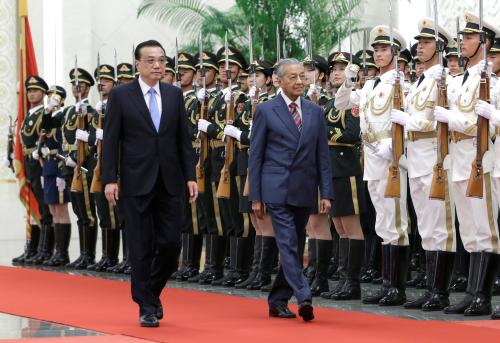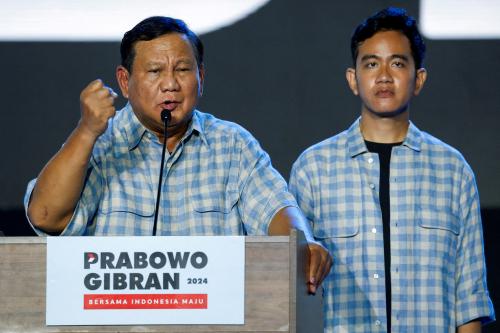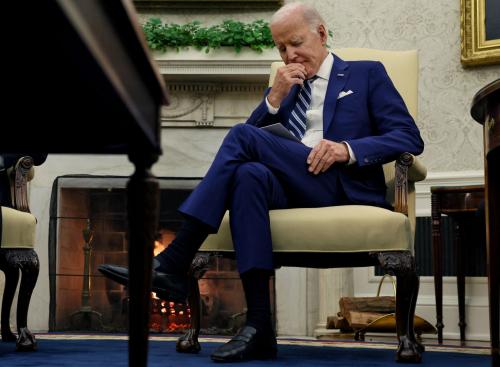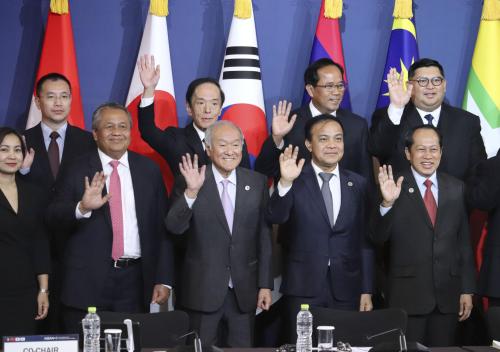Indonesians will go to the polls in April to elect their next president, national legislature, and many provincial and local governments. This will be Indonesia’s fourth direct presidential election and its fifth parliamentary election since the country democratized in 1999, propitious signs of a consolidated and maturing democracy. But although the 2019 election will mark two decades of Indonesian democracy, few Indonesians or Indonesia-watchers are satisfied with the state of Indonesian democracy. Questions of democratic backsliding loom large among country specialists—and among Indonesians, there are signs of growing popular dissatisfaction with Indonesian democracy.
In an era of global democratic retreat and populist advance, elections in the world’s third-most populous electoral democracy are a bellwether for the state of democracy globally. Democratic backsliding in Indonesia appears to match well Nancy Bermeo’s analysis of contemporary democratic backsliding around the world: not the result of a coup or a blatant vote fraud, but through executive aggrandizement or constitutionally-mandated restrictions on speech or competition that “are legitimated by the very institutions democracy promoters prioritize.”
Issues and Candidates
As a presidential democracy, the main show in April 2019 is the contest between incumbent President Joko Widodo (Jokowi) and former general and former Soeharto son-in-law Prabowo Subianto. The two faced off in 2014 in a contest between two populist visions for Indonesian politics: Jokowi’s inclusive or “technocratic” populism and Prabowo’s more muscular, nationalist, and “confrontational” populism. Both focused on making Indonesian government work for the Indonesian people, but can be contrasted by focusing on the terms commonly invoked to describe the two: jujur or “honest” for Jokowi, and tegas or “assertive and firm” for Prabowo.
In 2019, the choice is broadly similar. Jokowi is running on his record in office, including achievements in infrastructure development (sorely needed for this developing archipelagic state) and his effectiveness in office. Prabowo is running a more confrontational campaign, although in style it is notably more flaccid than his 2014 campaign. The polls look set for another Jokowi victory, which would mean that once again, a controversial populist with a stained military record from Indonesia’s authoritarian past will have been defeated at the ballot box by popular democrat campaigning on a record of performance.
Why, then, all the worry about Indonesian democracy? Answers can be found both in Indonesia’s political history and in other recent developments in national politics.
History and Context
By most accounts, Indonesia is an unlikely democracy. Indeed, perhaps more than in any other country, Indonesian elections are occasions for musing about the state of democracy in this complex, majority-Muslim, multiethnic, archipelagic state—as if repeated orderly transitions of power under electoral democracy were insufficient to mark the country as a consolidated democracy. Indonesia combines presidentialism with multi-partyism (an unlikely combination), and Indonesia’s political parties are increasingly tied to particular personalities and hard to differentiate from one another programmatically.
Indonesia is an unlikely democracy.
These are not propitious conditions for elections to serve as a tool for channeling popular demands to the policy process. The necessity of coalition governments under a presidential system, the absence of a dominant partisan cleavage, and the sheer diversity of Indonesian interests across regions, identity groups, and classes makes it difficult for elections to generate accountability and representation. Jokowi has tried hard to campaign on his record in office, but it is still the case that many Indonesian see their democratically elected governments as unaccountable. The choice between two candidates in an election—presidential or otherwise—may then depend less on policy platforms or record in office than on campaign style, identity, or related issues. To wit, the choice between jujur and tegas in comparing Jokowi and Prabowo.
These issues, of course, have long plagued Indonesian politics, and make it possible for populist leaders to appeal to the greater interests of the people in opposition to the complexities and frustrations of electoral politics. Indonesia’s brief experiment with liberal democracy in the early 1950s ended in just this way, with Sukarno’s move to “Guided Democracy” as a way to manage the competing forces of Islamism, nationalism, and communism in concert with a series of regional challenges to the Indonesian state. Guided Democracy fared poorly in practice, and was replaced by a hard authoritarian regime—Soeharto’s New Order—that substituted control for whatever notion of managed consensus was supposed to undergird Guided Democracy.
Indonesia today does not face quite the same array of competing political forces that it did in the 1950s: Communism was destroyed as a political force in the 1960s during the killings of 1965-66, and most serious regionalism movements have been defeated. What remains today is a growing cleavage between a more nationalist model for Indonesian politics and a more explicitly Islamist one. This is not a cleavage of secularism versus religiosity, for the Indonesian constitution reaffirms that that the country is a religious (if not Islamic) state, all nationalists of any prominence embrace their faith, and no non-Muslim candidate has any hope of serving as president. Still, the debate of what role Islam ought to play in Indonesian politics and society remains unsettled, and elite politicians and movement entrepreneurs alike have identified Islam as a potential mobilizational device in recent years.
The most prominent example is the successful political and legal campaigns against former Jakarta Governor Basuki Tjahaja Purnama (known as “Ahok” to most Indonesians), a Christian of Chinese ancestry and Jokowi’s former vice governor, for having insulted Islam. Like Jokowi as president, Ahok campaigned on his record in office, but even many voters who approved of that record in office voted against him because of his Christian and Chinese identity in a Muslim-majority city. Many observers see the instrumentalization of Islam as an identity claim—and not as an invocation of Muslim religiosity or piety—as central to understanding the increasingly illiberal character of Indonesian politics.
The response by Jokowi and Prabowo has been to adopt both nationalist and Islamic positions. In addition to endorsements from controversial Islamists such as Muhammad Rizieq Shihab, Prabowo’s campaign has earned endorsements from the Prosperous Justice Party, the largest Islamist party in the Indonesian parliament, as well as the National Mandate Party, affiliated with the modernist Muslim group Muhammadiyah. Jokowi’s choice of Ma’ruf Amin as his running mate brings him in line with the country’s influential mass Muslim organization Nahdlatul Ulama. Although Prabowo’s campaign has embraced the more hardline Islamist side of Indonesian politics, it is still telling that both campaigns seek to shore up both pious Muslim and nationalist constituencies. As a recent analysis from the Institute for Policy Analysis and Conflict makes clear, Islam as a mobilizational force can shape the direction of Indonesian politics even if Islamist parties fare poorly at the ballot box.
Separate from current developments in Indonesian Islam—which tend to attract wide attention—is the status of the Indonesian military. Military involvement in Indonesian politics dates back to the independence struggle against the Dutch following World War II, and under Soeharto’s New Order, the military was a central political actor whose doctrine of dwifungsi or “dual function” held that the military had both a defense and “sociopolitical” role. Democratization led to real reforms in the military’s role in politics, but the process of institutionalizing true civilian oversight remains incomplete. In an important essay that details a range of illiberal policy turns under the Jokowi administration, Tom Power identifies worrying signs of the return of dwifungsi-thinking in the military as well as opportunistic use of the military by Jokowi for political purposes.
Global Trends
The question of Indonesia’s democratic future and the April 2019 elections thus parallels the cross-national patterns of democratic backsliding identified in Bermeo’s prescient analysis. The risks of executive seizure of power seem remote, as do the risks of a coup from the military. But even the inclusive, developmentalist, performance-minded President Jokowi has overseen developments that undermine the quality of Indonesian democracy. His responses to the rising force of identitarian Islam have been mostly reactive. Were the world’s most populous Muslim country to suffer a serious democratic reversal, this would be a significant blow to the global prospects for democracy.
To be clear, Jokowi is no Victor Orbán, and Indonesia is not Hungary; Prabowo’s politics are reminiscent of Rodrigo Duterte and Jair Bolsonaro, but he appears set to lose once again. These are good signs that Indonesia may buck the global trend of democratic backsliding in its most worrisome form. Going forward, Indonesia’s democrats must be vigilant nevertheless.





Commentary
Indonesia’s upcoming elections, explained
March 20, 2019